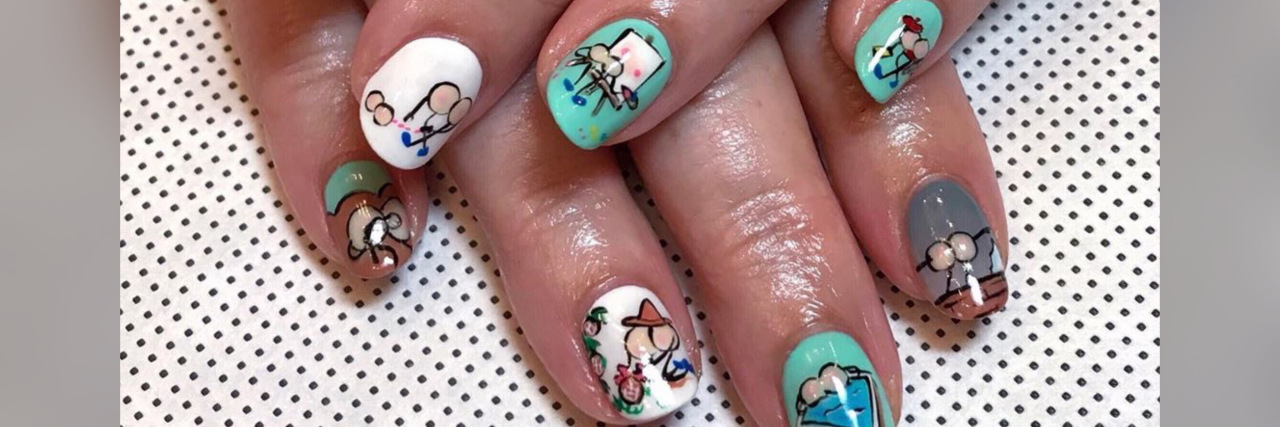What Fueled My Turning Point in Recovery After My Double Mastectomy
I am currently eight weeks post-op following a double mastectomy and DIEP flap reconstruction. Every time I try to explain to people how I’m feeling eight weeks after surgery, all I can manage to say is, “everything feels like a scribble.” Everything is this interconnected mishmash of emotions; I’m angry, I’m grateful, I’m terrified, I’m sometimes totally lost. I did not want to talk to many people after my diagnosis, and I felt like I had become some kind of dark Jesus — everyone wants to touch the hem of your sickly garments, give you sad looks and speak to you in whispers.
A lot of this feeling is obviously rooted in anger, and one of my continuing challenges has been figuring out how to allow people to love me. It is difficult to articulate the complex feelings that follow something like this — the flow of information is one of the only things you can control, and once it gets out, it is hard not to feel like you are being used as “tragedy porn.” Frankly, it is also discomfiting to think someone’s friend’s uncle may be out there thinking about your mastectomy. I found myself wanting to tell everyone and no one, “Let’s all talk about my boobs, but don’t you dare look at them!” I know I am putting out the “come here, go away” message and it is an unfair thing to put on people, but when else can you get away with being unfair? Cancer is ugly, people are complex and I am not someone who struggles in a graceful, Instagram-friendly way. In my darker moments I feel like Persephone — this experience has snatched me, and I am in the middle of trying to figure out my way back out.
I am young (32), and although I had been fairly recently diagnosed with Cowden syndrome, my doctor and I had made the decision to move forward with high-risk breast cancer screening rather than a prophylactic mastectomy. I decided long ago I’d had my fill of surgeries, and I was in no rush to have any more. I had settled into living a life of intense anxiety-inducing MRIs and mammograms twice a year, leaving me with six months in-between to try and be a human outside of cancer. I’d gone three years with clear scans (sometimes with growths and disappearances!), so the DCIS diagnosis was a surprise for all parties involved. The time from diagnosis to surgery was maybe a month — I am a rip-the-bandaid-off type person, so I knew I wanted to get the surgery done as quickly as possible.
You have to coordinate with a million people when you schedule surgery, an experience similar to consulting a magic eight ball — are the breast surgeon, plastic surgeon, anesthesiologist and operating room all available on the same day? Results unclear, ask again later. I was extra nervous trying to get everything scheduled since my breast surgeon was extremely pregnant (as in, she had her baby a week after my surgery) and I didn’t want to do the surgery with someone else. Luckily, we got July 22 as a surgery date and I had a team of women I felt comfortable with — and in my stronger moments, empowered by. I am continually grateful I have been surrounded by my medical dream team, from the hospital to home.
Everyone’s experience is different, but I found it extremely challenging to function in the space between diagnosis and surgery. I would show up to the office at work, but be completely unable to concentrate. Cancer has an uncanny ability to transform itself into the most searing intrusive thoughts, and it is very difficult to answer constituent phone calls when you’re also imagining your own death. “I’m not sure how high the bar in your bathroom should be sir, but while I have you on the phone, what do you know about post-surgical infections and wound care?” I was so incredibly lucky to have an understanding office and enough sick time to work half-days. For anyone about to go down a similar path, remember that taking care of yourself before surgery is just as important as after — you will want to go into this process feeling as empowered, strong and centered as possible to better situate yourself for an easier recovery.
For a while, I couldn’t muster the energy to figure out what that meant for me. I spent a lot of time shuffling around and sadly rattling my cancer chains like a ghostly Victorian widow, usually complemented by a lot of long, sad baths where I’d bring in a book and then stare blankly at it. (“Dune” is great for this.) Cancer’s boyfriend is situational depression, and he will come in and try to sap the joy from the edges of your existence — sometimes you have to sit in that sadness, but sometimes you have to push through and do the things that used to make you happy until you start to feel again. My turning point in moving forward was getting my nails done. My friend Meghann has always come through with pre-surgery masterpieces, and this time was no exception. “Bon Voyage, Boobs” was our theme, and the four hours we spent envisioning my boobs’ early retirement life recharged me in a way I didn’t think was possible.
Even though I’m not the one painting my nails, the time spent creating these nail sets are like little battles where I get to beat the shit out of cancer, chronic illness and trauma by turning it into something that makes me laugh instead of something constantly trying to bring me shame.
You can follow my journey on Touch My Boobs
Original photo by author

